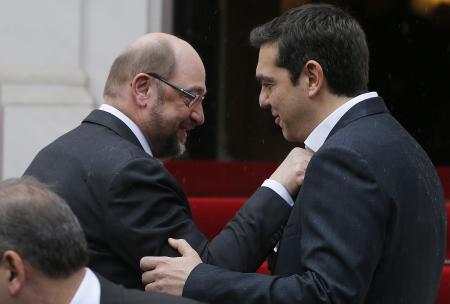By Kathleen Caulderwood -

Tensions between Greece and the eurozone continue to escalate, even as the country's new anti-austerity government modified a plan to write off its debt, which amounts to roughly $356 billion, or about 175 percent of its current gross domestic product.
After first refusing to speak with the lenders that have been bailing out Greece since 2010, Athens' new leftist leadership softened its stance over the weekend, and is now seeking a “mutually beneficial” deal with the European Commission, European Central Bank and International Monetary Fund -- known as the troika.
But despite a new public relations tack, analysts, investors and politicians are still nervous about what’s next.
“Despite the fact that recent developments point towards a more conciliatory outcome relative to Friday’s press conference, the government’s endeavors face serious challenges,” wrote Nomura analyst Nick Matthews in a recent note. “We continue to expect significant volatility in Greek assets in the coming weeks as the Greek government and the eurozone attempt to reach an agreement on how to proceed with the Greek program.”
Yanis Varoufakis, 53, is an economist who authored a book on game theory before he was appointed Greece’s finance minister last week in the wake of the leftist, anti-austerity Syriza party's election victory. He’s been on a tour of Europe, trying to drum up support for his plan to renegotiate Greece’s bailout, which includes a plan to swap its current debt for growth-linked and long-dated bonds, while he tries to crack down on internal problems such as tax evasion.
While Varoufakis seems enthusiastic that some sort of deal can be arranged within a few days, others are more dubious.
“We had a constructive discussion, and it is clear that the standoff between Greece and the eurozone is the greatest risk to the global economy,” said British Chancellor of the Exchequer (treasury chief) George Osborne after meeting with Varoufakis at 11 Downing Street, London, according to the Guardian. “It is a rising threat to the British economy. We have got to make sure that in Europe, as in Britain, we choose competence over chaos.”
